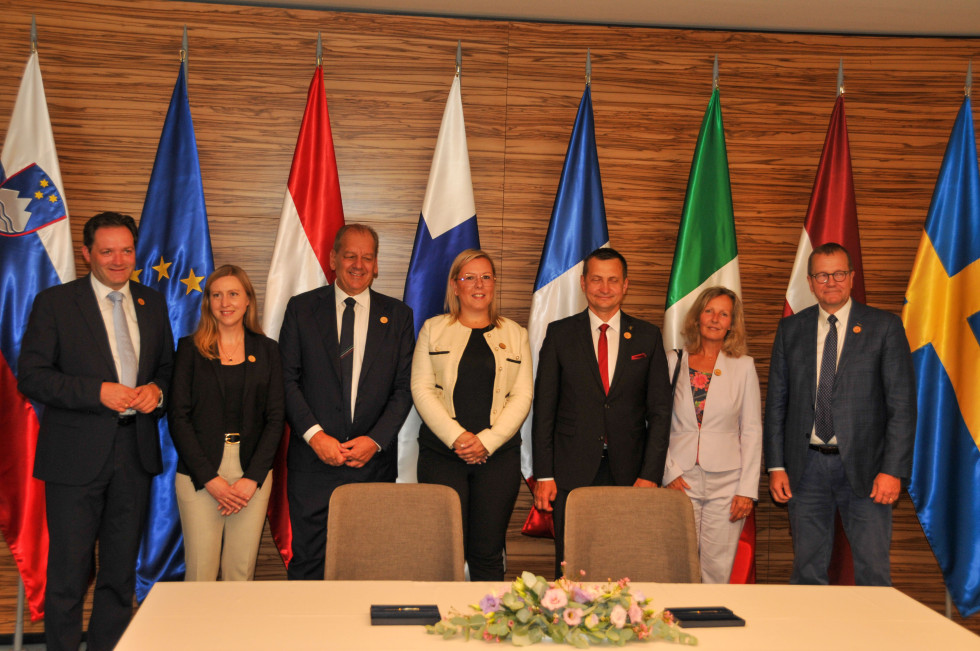Italy and Latvia join For Forest Group +

For Forest Group + meeting. | Author Ministrstvo za kmetijstvo, gozdarstvo in prehrano
The meeting in Maribor is intended to facilitate in-depth political dialogue on the current challenges facing the European forestry sector. The key topics of discussion are climate change and the role of forests as carbon sinks, sustainable forest management, implementation of European legislation – including the Regulation on land use, land-use change and forestry (LULUCF), the elimination of deforestation (European Union Regulation on Deforestation-free Products, EUDR) and nature restoration (Nature Restoration Regulation, NRR). The directors of the forestry institutes of the Member States also participate in the discussion, which enables a direct link between policy and science.
Slovenia has a long tradition of sustainable, multifunctional and close-to-nature management. Forests cover 58 per cent of the country, making it one of the most forested EU Member States. Slovenia's model is based on promoting natural processes, natural regeneration and prohibiting clear-cutting, thereby intertwining the economic, environmental and social functions of forests. The Slovenian Forest Service plays a key role in this, providing expert support to more than 400,000 forest owners.
This approach was recently further confirmed by the inclusion of close-to-nature forest management in the Register of Intangible Cultural Heritage. This is yet another confirmation that Slovenian forestry has a wealth of expertise and a long tradition of forest management that best mimics natural processes in nature. This is the story we want to share with our partners in the group.
An official ministerial meeting and working consultation took place on Thursday, and today the participants will go on a professional excursion to learn about examples of good practices in Slovenia. Among other things, they will observe the management of private forests, visit a high-altitude farm and learn about the forests of the Pahernik Foundation, which is part of the European Pro Silva network. A visit to the Centre for the Promotion of Sustainable and Close-to-Nature Forest Management in Radlje ob Dravi and a presentation of the cultural heritage of wood use are also planned.
Minister Mateja Čalušić emphasises that the meeting in Maribor is an important opportunity to strengthen cooperation between the member states of the Forest Group +, exchanging professional experience and strengthening a common approach to the sustainable management of European forests in times of climate change and new EU legislative requirements.
The partnership advocates a holistic approach to sustainable forest management, in which all forest functions – economic, environmental and social – are treated equally, in accordance with the principles of the FOREST EUROPE process. The partnership approach is consistent with the economic model in Slovenia, which has long promoted the multifunctional use of forests. In addition, the partnership advocates respect for and recognition of existing national management systems, forest inventories, programmes and strategies, as well as cultural and historical management practices.
Slovenia – one of the most forested countries in Europe
More than half of Slovenia (58 per cent) is covered by forests, which are one of the key elements of its landscape. This ranks it among the most forested countries in Europe. A total of 71 tree species thrive in Slovenian forests: ten of these are coniferous and 61 are deciduous. The timber stock of Slovenian forests amounts to 303 million cubic metres, with an annual increment of approximately 7.5 cubic metres per hectare, while felling remains below the allowable level.
Most forests are privately owned (71 per cent), but the holdings are very fragmented and small (three hectares on average), which makes it difficult for owners to manage them efficiently.
Forests have an important environmental, social and economic function. In addition to their ecological benefits, they are a source of lasting economic benefits, particularly through the timber industry and tourism.
Slovenia follows the Resolution on the National Forest Programme, which aims at forest management that is sustainable, close-to-nature and multifunctional. The Operational Programme (2022–2026) includes guidelines for preserving biodiversity, ecological balance and the social and economic functions of forests. Legislation stipulates the obligations of forest owners, such as sustainable management and allowing public access.
The Slovenian Forest Service and the Forestry Institute are responsible for the implementation of public forestry services. Their activities include monitoring the state of forests, providing advisory services to forest owners, producing forest seeds and seedlings and other tasks co-financed from the state budget.

